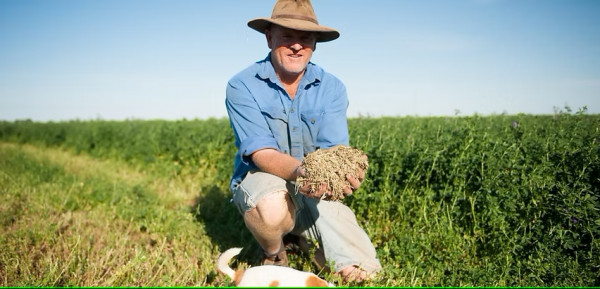DAIRY farmers with a new direction – Paul Monigatti, and his wife Katrina, and brother Bryan and his wife Bev – today run Rich River Chaff and Grain across two properties.
One at Strathallan in northern Victoria and a second at Pretty Pine near Deniliquin.
The families moved to their current property 45 years ago, and having now personally chalked up some 40 years of experience on the land; it is safe to say farming runs in the family.
Paul said the two-property farming enterprises grow a variety of crops, including lucerne and oaten hay as well as grain.
He said the hay is milled for chaff and sold as high-quality horse feed, while on the grain side of the operation, wheat, canola, barley, beans and oats are grown in rotation.
A few sheep are also run on lucerne, to keep it under control over winter.
“The 3000 acres at Strathallan consists of self-mulching clay and in comparison, the 2500 acres at Deniliquin are best described as being variable, ranging from sand hills to heavy clay,” Paul explained.
“Irrigation is a key element used to maximise productivity and whole had only received 40mm this into June, most of the country was pre-irrigated,” he said.
“Even with irrigation, the crops have been slow emerging. We have been spoilt in this area with early breaks, but this year we are way behind where we would like to be, although everything is pretty steady at the moment.
“When we examine the immediate challenges of this season, we are fortunate that irrigation enables us to start and finish crops.”
Paul said they also face the other issues common to crop production, including resistant ryegrass, so farming is never without its problems.
He said labour is another issue, particularly on the milling side of their operation, and there are not really any off-the-shelf solutions to deliver efficiencies in this area.
“To help with this, we have engaged outside assistance to review our current processes and identify opportunities for automation,” Paul said.
“So far, we have implemented a robot to stack bags, and having seen what can be done, it has opened our eyes to push further down the process to see what other areas can be productively improved.
“The irrigation side of things is another area where changes can be made to streamline the operation.
“Automation has reached a point where, realistically, you can simply push a button and an irrigator will start.”
Machinery has also been a significant benefit on the farms.
“When it comes to small bales of hay, where previously you needed plenty of people to stack bales by hand, you can now bale a few thousand bales, stack it up and cart it away on your own in a day,” Paul said.
“It’s the same with modern headers, with the technology which can pretty well drive itself.”
Paul said the families had agreed until you have a good look at how you do things, you don’t really know what needs to change.
He said there is so much technology out there, and if it can work to your benefit, you need to grab it and go.
“It is this sense of having to look at what is available and being up to date that encouraged me to attend the GrainGrowers marketing workshop,” Paul said.
“It was the first one I have been to, but it provided me with valuable insight into how to market our grain more effectively.
“While we often discuss technology and staying up to date, it’s essential not to forget people and a sense of community are the things which hold us together and form the backbone of an area.
“I am currently involved in a local project to save the 100-year-old Strathallan Hall from demolition. It was initially built by the community, and now, as a community, we are looking to rebuild it as a meeting place and a space where the approximately 180 people who live in the area can come together.
“When people ask me what I enjoy about farming, I tell them it’s simple – it’s about planting a seed, seeing it come to life with rain, watching it grow into a decent crop and being able to harvest and sell it.
“There are plenty of challenges, but that’s just farming.
“And as a fifth-generation farmer, I look forward to hopefully some of the children coming home in the future.”
















